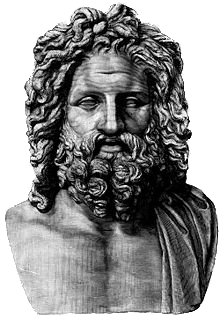Gods and Goddesses, in Greek Mythology, are immortals who are referred to as "deathless ones" in Theogony.[1] The various types of Gods are Protogenoi, Gigantes, Titans, Olympians, Okeanics, and Chthonics. Some of the main gods are Zeus, god of lightning; Poseidon, god of the sea; Ares, god of war; Apollo, god of the sun; Hermes, messenger of the gods; Hephaestus, god of the forge, fire and smithing; Dionysus, god of wine; Hades, god of the dead; Artemis, goddess of the hunt; Aphrodite, goddess of love; Hera, goddess of marriage; Demeter, goddess of the harvest; and Hestia, goddess of the hearth.
History
The first gods Olympians born to Titans Kronus and Rhea. They had six children, five of which were eaten by Kronus. Later, Zeus, the last child who was not eaten, fed a mixture of wine and honey to Kronus, vomiting his brothers and sisters. In other myths, Gaea wrapped a rock with baby clothes and a blanket with Kronus thinking it was Zeus. This started the Titanomachy. Later, after the gods won, they had children who would also be gods. Ouranos's remains caused seafoam, which turned into Aphrodite.
References
- ↑ Theogony of Hesiod (ll. 1-25)
